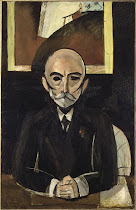The Rise

In 1789 the French Revolution changed the political face of Europe. In France, a popular uprising, led by relatively young and wealthy professionals (lawyers like Robespierre) demanded a voice in politics. They drew support from the general discontent in the country -overtaxed peasants and dissatisfied aristocrats. They tried to compromise with their King and force him to sign a constitution to limit his powers. But King Louis the 16th dragged his feet and plotted against them.
Along came voices like Robespierre. He sat at the back of the newly formed Assembly. The King was virtually imprisoned as they debated his fate. Robespierre was to deliver some of the most fiery and uncompromising speeches.
"Louis must die, so that the country may live."
-Robespierre
The vote was taken. 361 FOR 288 AGAINST with 72 voting for a delay of the issue. This was the new democracy. They chopped off the king's head. Then his children's heads. Then his wife's (Marie Antoinette). As you can imagine this did not go over well in Europe. Every monarch was pissed and a little frightened by what had happened in France. War began.
The King was dead but you can tell by the close vote that not everyone was on board with the decision. Radicals like Robespierre feared the threat of a counterrevolution to impose a new monarch in France. The Committee for Public Safety was formed and an era of the revolution known as 'the Terror' began. Heads rolled. Robespierre rode highest on the wave. It's difficult to gauge Maximilien's actual involvement with the Committee because other politicians would heap the blame on him -after his death. Yet it's easy to see, from his fiery speeches, that he felt violence was a necessary part of the revolution.
Terror is only justice prompt, severe and inflexible; it is then an emanation of virtue; it is less a distinct principle than a natural consequence of the general principle of democracy, applied to the most pressing wants of the country.
-Robespierre
The Fall
 Perhaps the turning point was when Robespierre turned on Georges Danton for being too moderate. Danton was also an exceptional speaker who had accepted violence as part of the revolution. But then he thought it had gone too far. Robespierre's influence was tied to the power held by the Committee. He branded Danton a counterrevolutionary. Heads rolled. (picture: Gerard Depardieu as Danton. Good looks will not save you.) Eventually the Assembly, now the National Convention, tired of the violence and of Robespierre's passionate speeches. They called for his arrest but he and his closest supporters escaped. As the government forces entered the Hotel de Ville Robespierre tried to kill himself. But the bullet only destroyed his jaw. He was captured, put in jail, and guillotined the next day. They had to pull the bandages off of his face so his head would fit into the hole. Several sources say he let out a long chilling scream that was cut off by the dropping blade.
Perhaps the turning point was when Robespierre turned on Georges Danton for being too moderate. Danton was also an exceptional speaker who had accepted violence as part of the revolution. But then he thought it had gone too far. Robespierre's influence was tied to the power held by the Committee. He branded Danton a counterrevolutionary. Heads rolled. (picture: Gerard Depardieu as Danton. Good looks will not save you.) Eventually the Assembly, now the National Convention, tired of the violence and of Robespierre's passionate speeches. They called for his arrest but he and his closest supporters escaped. As the government forces entered the Hotel de Ville Robespierre tried to kill himself. But the bullet only destroyed his jaw. He was captured, put in jail, and guillotined the next day. They had to pull the bandages off of his face so his head would fit into the hole. Several sources say he let out a long chilling scream that was cut off by the dropping blade.
During the seizure Robespierre was shot in the jaw, probably in a botched suicide, and then led to the guillotine with bandages around his head. The bandages blocked his head from fitting into the execution machine, so they were ripped off. The head went into its stock. The blade was raised for its fall. Robespierre began to scream, a terrible, unforgettable cry that was to live in nightmares until it suddenly stopped.
-Andress, David. The Terror: The Merciless War for Freedom in Revolutionary France.
Maximilien Robespierre
The man who had called for the death of France's King is eventually killed by the very methods he had championed to purify the revolution.
Furthermore:
When shit went down at the Hotel de Ville on 9 Thermidor (the 9th of some French Revolution month. They were even revolutionating their calendars.) some dude claimed that he heroically shot Robespierre in the face. The painter who crafted this blasterpiece clearly liked that version.
Not pictured here: Augustin Robespierre (brother).

When Max was arrested Aug said: "I am as guilty as him; I share his virtues, I want to share his fate. I ask also to be charged" Later, he tried to escape the shootout by jumping out of the window. He broke both of his legs and they guillotined him the next morning with his brother. There's no such thing as a peaceful revolution. I've always thought that Robespierre seems less crazy when I found out what they did to him.




No comments:
Post a Comment